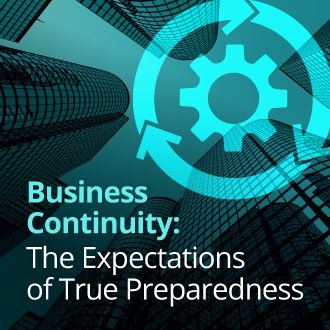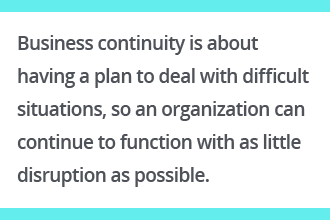Business Continuity: Expectations of True Preparedness

Business applications are mission critical for every enterprise, and the ability to maintain ‘always on’ live operations for customers and employees has never been more important. Every business regularly examines how they can ensure business continuity. But this comes along with a price tag. More protection typically equals more complexity, more cost, and more overhead which can lead to low acceptance and dissatisfaction among staff (too cumbersome) and consequently, poorer results. However, the expectations of true preparedness for a crisis or potential disruption continue to escalate.
The organizations that were best able to ensure business continuity during the COVID pandemic were the ones that were forward-thinking in their readiness to secure mission-critical applications.

Business continuity is about having a plan to deal with difficult situations, so an organization can continue to function with as little disruption or data loss as possible. Other risks, such as ransomware or natural disasters, drive continuity models that, at their best, assume and prepare for the worst to ensure a level of continued thriving.
Historically, companies have focused on simply keeping the routine, day-to-day operations amid disaster recovery. Both the COVID pandemic and the broadening of the digital threat landscape with more frequent, bolder cyberattacks have been change agents in facilitating a more comprehensive, all-hands-on-deck approach to continuity.
Focus on Key Metrics
To understand how organizations approach disaster recovery and business continuity, it’s important to know how to define RTO (Recovery Time Objective) and RPO (Recovery Point Objective). These disaster recovery metrics help to determine how much time will be needed to bounce back from an event, and how much data (if any) might be lost.
RTO is about a business’s technology systems as a whole and represents the maximum tolerable downtime a business can afford to endure. The recovery time measures how long it will take to get its critical systems back online and operational. If a business can get by without its IT systems for a long period of time, it can endure a much higher recovery time objective than a company that will feel the impact of that loss very quickly.
RPO is how much data a company can lose in terms of time after a recovery from a cyberattack or disaster before it harms the business. Modern technologies like Active-Active replication can deliver potential zero RPO (no data loss) continuous operations, and advanced snapshots can deliver low RPO (possibly as low as minutes). If the online data has been fully compromised, good backup/restore technology will provide a longer RPO, but with confidence in the integrity of the data being restored.
In the enterprise market, today’s service level agreements (SLA) – the standard for maintaining a high level of business continuity – are formulated on achieving RPO and RTO goals.
Squaring the Circle
When a company can achieve true zero RPO at true zero RTO, then no data is lost and operations are continuous, without any human intervention.
Infinidat has long recognized that the lifeblood of an organization is maintaining both the availability and the integrity of its data and has designed its storage capabilities based on an architecture that ensures mission critical data storage with 100 percent data availability guaranteed.
We can, of course, help ensure against anything up to full data center loss by providing Active/Active configurations, and extending the protection through multi-site replication. Infinidat can provide excellent protection for rapid recovery after a cyber attack through the use of immutable snapshot technology.
All Infinidat software features are standard and included, and can provide an incredible breadth of data protection against almost any kind of threat, whether it be natural, accidental, or intentionally malicious.
For more information, click here.

